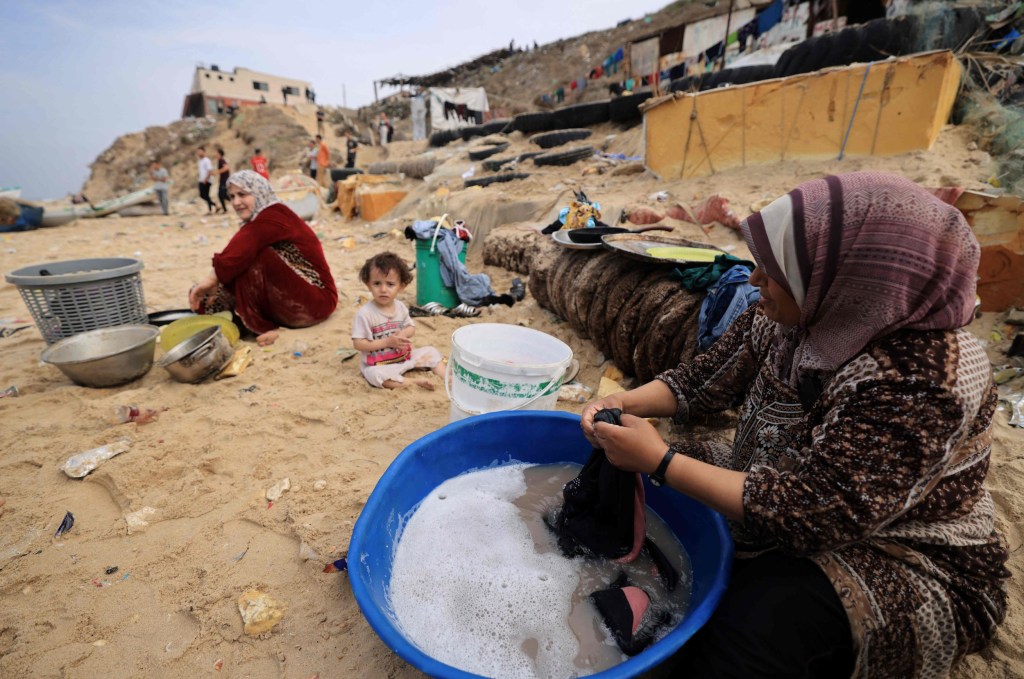Palestinian women wash their clothes using sea water due to the lack of fresh water and electricity, along the beach in Deir el-Balah in the southern Gaza Strip (Picture: AFP)
Women and girls across Gaza are resorting to using scraps of tent material in place of period products, only deepening their agony.
As Israel pressed with its assault on Palestinians in ‘flagrant breach of international law’, food, water and sanitary items remain in desperately short supply across the besieged Strip.
Forced to abandon their homes in search of whatever safety there is, women and girls face catastrophic humanitarian conditions.
Action Aid has reported of displaced women living in the southern city of Rafah who are cutting out small pieces of the tents they rely on for shelter from the cold and rain to use as a substitute for period products, risking infection.
The lack of water also means keeping clean is near impossible, with women telling aid workers they have gone for weeks without showering.
A staff member at Action Aid Palestine, who wished to remain anonymous, has been displaced from her home three times and is now in the south of Gaza.
To view this video please enable JavaScript, and consider upgrading to a web
browser that
supports HTML5
video
‘There is no water. I suffered during my period,’ she said.
‘There was no water available for me to get clean during my period. I had no sanitary pads for my own needs throughout my period.’
Follow Metro on WhatsApp to be the first to get all the latest news
Want to be the first to hear the world’s top stories? Metro.co.uk is now on WhatsApp sending vital updates and top trending stories straight to your phone.
Follow us to receive the latest news updates from Metro (Picture: Getty Images)
Join the Metro WhatsApp community now for breaking news, juicy showbiz stories and must-watch videos from across our website.
Simply click on this link and select ‘Join Chat’. Don’t forget to turn on notifications so you’ll always be the first to hear the latest!
The streets of Rafah, adjacent to the Egyptian border, have been transformed into open-air latrines.
Piles of rubbish cover the city, which has become a vast refugee camp as most Gazans have been prevented from leaving the territory.
Palestinian women who have sought refuge in Rafah (Picture: Getty)
Palestinian women wash their clothes in the sea amid the humanitarian disaster they are facing (Picture: AFP)
With Rafah currently hosting more than a million displaced people – more than four times its usual population – in extremely overcrowded conditions, there is no privacy.
Queues for toilets are extremely long, with the United Nations Relief and Works Agency (UNRWA) estimating that at its shelters in Rafah there is only one toilet per 486 people.
The humanitarian disaster is only worsened by the air and ground assault on all corners of Gaza.
Israel stepped up attacks on Khan Younis in the south on Wednesday, pushing tanks westwards and prompting accusations from Jordan that its field hospital in the city had been badly damaged by nearby shelling.
The Jordanian army said it held Israel responsible for a ‘flagrant breach of international law’ in what it said was the damage to the facility as a result of Israeli shelling in the vicinity.
There was no immediate comment from the Israeli military.
People in and around another hospital, Nasser, fled as tanks approached the district overnight following an Israeli army statement that it had come under fire from the area.
Get in touch with our news team by emailing us at [email protected].
For more stories like this, check our news page.
Food, water and sanitary items remain in desperately short supply across Gaza.


